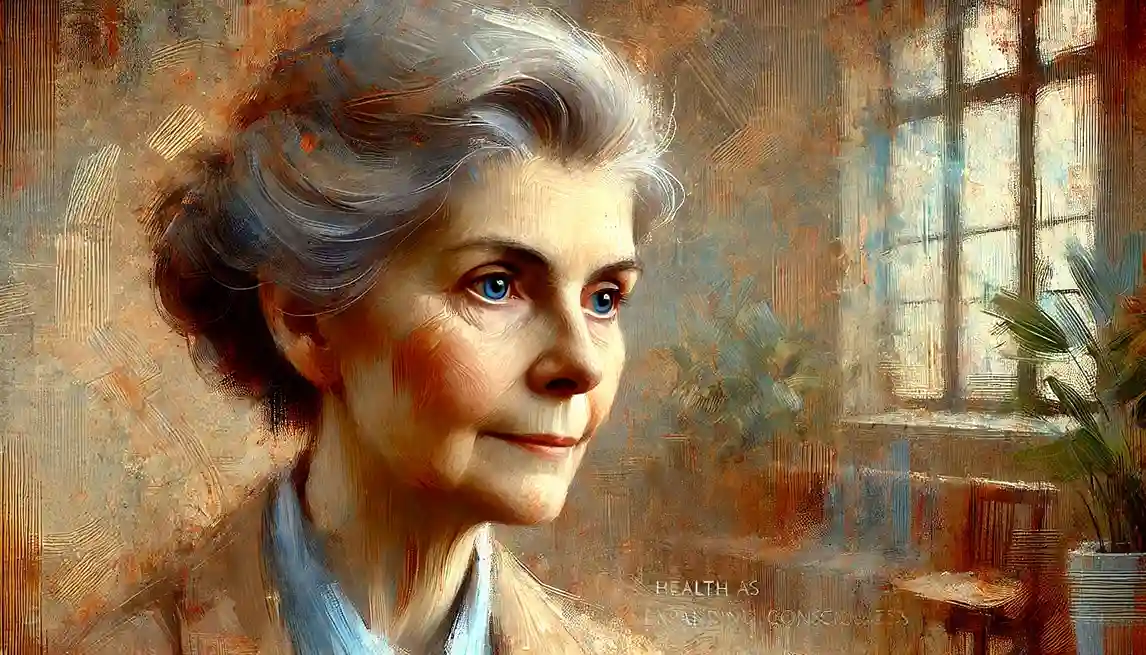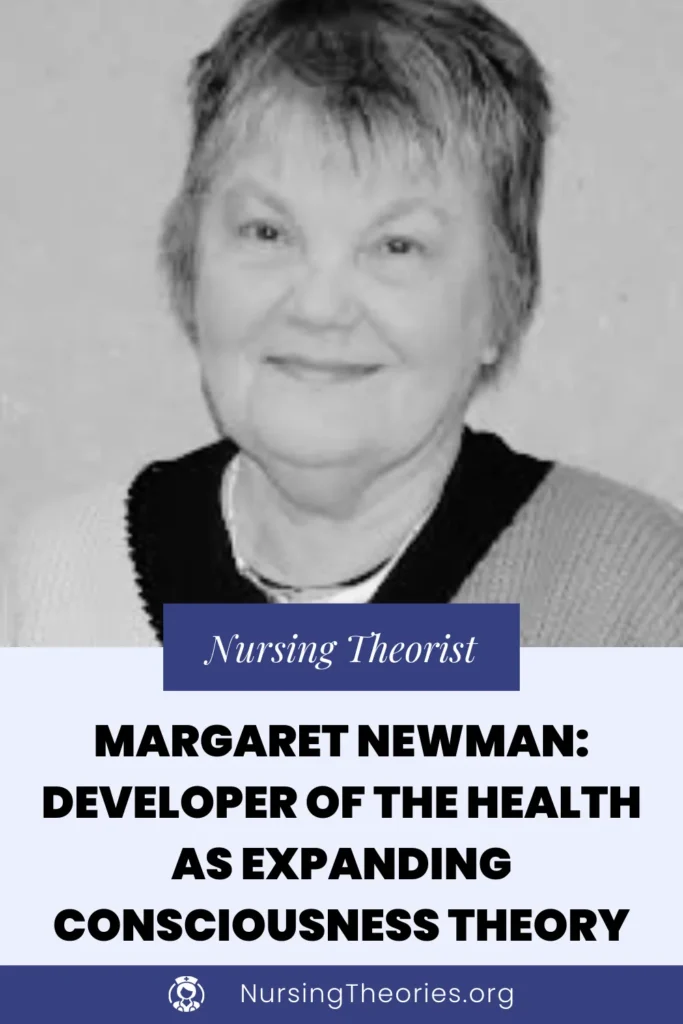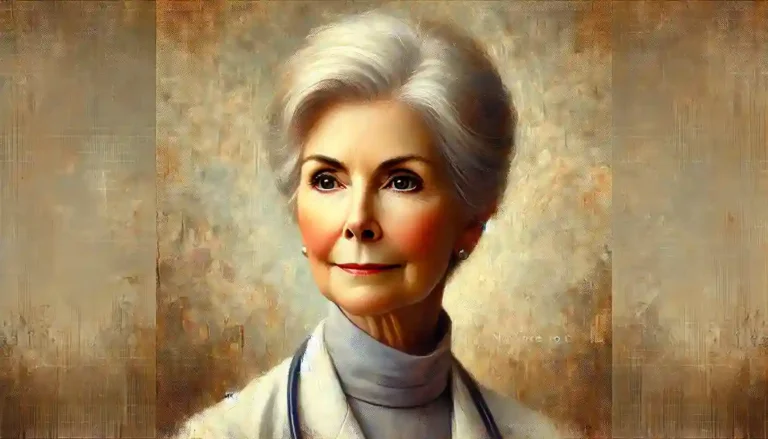Margaret Newman, a visionary nurse theorist and educator, is celebrated for her development of the Health as Expanding Consciousness Theory.
Her theory redefined the concept of health by emphasizing the connection between illness and personal growth, suggesting that health is not merely the absence of disease but a dynamic process of expanding awareness.
Newman’s contributions have significantly influenced holistic and patient-centered approaches to nursing care.
In this article, we cover Margaret Newman’s life, achievements, philosophy, and lasting impact on modern nursing.

Quick Summary
- Developed the Health as Expanding Consciousness Theory, which focuses on the relationship between health, illness, and personal transformation.
- Emphasized that health is a dynamic, holistic process involving expanded awareness and self-discovery.
- Advocated for a patient-centered approach that recognizes the role of illness in promoting growth and change.
- Authored influential publications that continue to shape nursing education and practice globally.
- Recognized as a pioneer in integrating spirituality, consciousness, and holistic care into nursing.
Early Life and Background of Margaret Newman

Birth and Family Background of Margaret Newman
- Margaret A. Newman was born on October 10, 1933, in Memphis, Tennessee, into a family that valued education and personal development.
- Her early exposure to healthcare settings through family experiences influenced her decision to pursue a career in nursing.
Education and Early Influences in Newman’s Life
- Newman earned her bachelor’s degree in nursing from the University of Tennessee in 1962.
- She completed her master’s degree in medical-surgical nursing and a doctorate in nursing science from New York University.
- Her academic journey, combined with her clinical experiences, shaped her understanding of the connection between health, consciousness, and personal growth.
Margaret Newman’s Philosophy and Vision for Nursing
- Newman believed that health and illness are part of a unified process of expanding awareness and that nurses play a vital role in helping patients find meaning in their experiences.
- Her vision emphasized holistic care that addresses the spiritual, emotional, and psychological dimensions of health.
- Famous quote: “Every person, no matter the severity of illness, is part of a continuous process of change and transformation.”
Margaret Newman’s Education and Early Nursing Career
Formal Education and Nursing Training of Margaret Newman
- Newman’s education in nursing science, philosophy, and medical-surgical nursing provided her with a comprehensive understanding of holistic care.
- Her studies allowed her to develop a theory that integrates spirituality and consciousness with nursing practice.
Early Professional Experiences in Newman’s Career
- Newman worked as a clinical nurse in various healthcare settings before transitioning to academic roles.
- Her experiences with patients facing chronic illnesses and life-altering conditions inspired her to explore the deeper meaning of health and illness.
Key Achievements and Contributions of Margaret Newman
Development of the Health as Expanding Consciousness Theory
- Newman’s theory focuses on the relationship between health, consciousness, and personal transformation. Key concepts include:
- Pattern Recognition: Health involves recognizing patterns of interaction between individuals and their environment.
- Consciousness Expansion: Illness can be a catalyst for self-awareness, leading to personal growth and healing.
- Holistic Perspective: Nurses should address physical, emotional, and spiritual dimensions of health.
- Patient-Nurse Partnership: The nurse’s role is to facilitate the patient’s journey toward expanded awareness and understanding.
Contributions to Nursing Education and Curriculum Development
- Newman integrated her theory into nursing education, emphasizing the importance of holistic assessments and patient-centered care.
- She designed teaching methods that encourage students to explore the spiritual and psychological aspects of health.
Research and Theoretical Advancements
- Newman conducted research on consciousness and its impact on health outcomes, providing empirical support for her theory.
- Her studies highlighted the role of nurses in fostering healing environments that promote self-discovery.
Global Impact and Recognition
- Newman’s theory has been adopted in nursing education and practice worldwide, influencing holistic and integrative care approaches.
- She received numerous awards and honors for her contributions to nursing theory and research.
Overview of Margaret Newman’s Health as Expanding Consciousness Theory
- The theory guides nurses in helping patients view illness as an opportunity for personal growth and expanded awareness.
- By recognizing the patterns of interaction between health and environment, nurses can provide holistic care that promotes healing.
- To explore this theory in greater depth, visit the in-depth article on the Health as Expanding Consciousness Theory.
Notable Publications by Margaret Newman
- Health as Expanding Consciousness – A foundational text that elaborates on her theory and its applications.
- A Developing Discipline: Selected Works of Margaret Newman – A collection of her most influential writings on nursing theory.
- Numerous articles on holistic care, consciousness, and nursing interventions.
Challenges and Criticisms of Margaret Newman’s Work
Challenges in Implementing the Theory in Clinical Settings
- Some healthcare providers have found it challenging to apply the theory in fast-paced environments where immediate outcomes are prioritized.
- Newman emphasized the importance of integrating holistic practices without compromising the efficiency of care.
Criticisms of the Abstract Nature of the Theory
- Critics argue that the abstract concepts of consciousness and self-awareness can be difficult to measure and apply in practice.
- However, proponents highlight the theory’s success in fostering meaningful nurse-patient relationships and long-term healing.
Timeline of Major Milestones in Margaret Newman’s Life
- 1933: Born in Memphis, Tennessee.
- 1962: Earned her bachelor’s degree in nursing.
- 1978: Developed the Health as Expanding Consciousness Theory.
- 1986: Published Health as Expanding Consciousness.
- 2008: Inducted into the American Academy of Nursing as a Living Legend.
- 2018: Passed away, leaving a lasting legacy in nursing theory.
Legacy and Lasting Impact of Margaret Newman
Impact on Nursing Practice and Patient Care
- Newman’s theory has improved nursing assessments and interventions by addressing the holistic needs of patients.
Global Influence and Recognitions
- Her work is taught in nursing schools worldwide and applied in various healthcare settings.
- Newman’s contributions have earned her numerous posthumous honors and recognitions.
Final Years and Passing of Margaret Newman
- Newman continued to mentor students and contribute to research until her passing in 2018.
- Her legacy lives on through the widespread application of her theory in nursing education and practice.
Key Lessons from Margaret Newman for Modern Nursing
- Holistic care: Addressing physical, emotional, and spiritual needs leads to better patient outcomes.
- Illness as growth: Viewing illness as an opportunity for personal transformation promotes healing.
- Patient-centered partnerships: Collaborative nurse-patient relationships enhance the healing process.
- Pattern recognition: Understanding patterns in health and behavior is key to holistic assessments.
- Continuous learning: Nurses should embrace ongoing learning to meet the evolving needs of patients.
Conclusion
Margaret Newman’s Health as Expanding Consciousness Theory has transformed nursing by emphasizing the holistic and dynamic nature of health.
Her work, explored further in the in-depth article on the Health as Expanding Consciousness Theory, continues to guide nursing education and practice globally.
Newman’s legacy endures as her theory remains central to promoting holistic, patient-centered care and personal growth.



